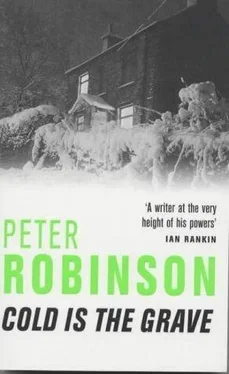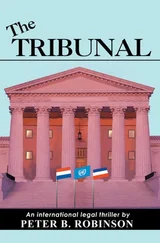Banks remembered some of the victims, especially the young ones – Deborah Harrison, Sally Lumb, Caroline Hartley. He had come to know and care about all these victims. Even Gloria Shackleton, murdered long before Banks had been born, had come to obsess him only a few months ago. And now Emily Riddle. It didn’t matter what anyone said about not becoming personally involved with cases, Banks thought. You had to be personally involved; there had to be something more at stake than mere crime statistics.
“Problem is,” Burgess went on, “we don’t really know enough about him.”
“Any form?”
Burgess sniffed. “Minor drug bust in ’74. Half a pound of Nepalese black. Said it was for his own consumption. Well, I believed him – I could go through that much in a week easily – but the magistrates didn’t. They gave him eighteen months, out in nine.”
“Is he still dealing?”
“Not that we know of. If he is, he’s not in the premier league.” Burgess pushed his plate away. “Too bloody tough for my teeth,” he said. Apart from his crooked and stained teeth, Banks noticed, Burgess seemed in better shape than the last time they had met. He had even lost a little weight. He still had his graying hair tied in a ponytail, which irritated Banks, who thought that middle-aged men with ponytails looked like prize wankers, and his gray eyes were as sharp, as cynical and as world-weary as ever.
The last time they had met, Banks remembered, was in Amsterdam over a year ago, when Burgess had got pissed and fallen in a canal. Banks had helped him out and taken him back to the hotel, and the last he had seen of him, Burgess was trailing dirty canal water across the lobby, his shoes squelching as he went, head held high, trying to walk in a straight line, with dignity. He had been wearing the same scuffed leather jacket he was wearing today.
“How does he pay for that bloody great villa of his?” Banks asked.
“Which one?”
“Little Venice. You mean he’s got more than one?”
“Sure. There’s two that we know of. The one in Little Venice and one outside Arenys de Mar, in Spain.”
“So where does his money come from?”
“He’s a gangster.”
“So I’ve heard. I didn’t know they were back in fashion.”
“They never really went away. They just adapted, changed names, switched rackets.”
“What sort of a gangster is Clough, then?”
Burgess lit one of his small cigars before answering. “First off,” he said, “he’s got a legitimate front. He owns a very successful bar in Clerkenwell. Popular with the City Boys. Gets some good bands, serves first-class food and booze. You know the type of place: ‘How about a little coke and crème caramel to end the perfect evening, darling?’ Then they go off home for the perfect shag. We know he’s into all sorts of things, but we’ve never been able to get him on anything. He runs things, delegates, doesn’t get his hands dirty. Basically, he bankrolls dodgy or downright criminal operations and rakes in a big cut. As far as we know, he made a pile of money managing and promoting bands in the music business years ago and invested it in a life of crime.”
“Bootlegging.”
“What?”
“That’s how he made his pile,” Banks explained. “Making bootleg recordings of live concerts, getting them pressed and selling them.”
Burgess narrowed his eyes. “You seem to know a lot about him. Sure you want me to go on?”
Banks smiled. “It’s a matter of making a little go a long way. That’s all I know. Anyway, it looks as if it paid off.”
“Big-time.”
“What kinds of things is he interested in now, if it’s not drugs?”
“All sorts. I’ll give him his due; he’s innovative. Prefers newer, safer rackets to the old true, tested and tried. That’s why I don’t see him dealing drugs. Taking them, yes, but not dealing them. Not his style. You won’t find him running girls or protection rackets, either. Not Barry Clough. Guns, though, now there’s another matter. Remember that business with the reactivated firearms a year or so back? Up around your neck of the woods, wasn’t it?”
“Thirsk,” said Banks. “Yes, I remember.” Undercover policemen posing as London gangsters had arrested four men on charges of conspiracy to transfer firearms and ammunition, and for selling prohibited weapons. Since stricter gun laws were introduced after the Dunblane school massacre, firearms became harder to get because the risk attached to possessing or selling them was far greater. That also put their price up. To fill the gap, workshops like the one near Thirsk sprang up. It took about two hours to reactivate an Uzi that had been disabled for legal sale to a collector, and you could sell it for about £1,250. Tanfoglio pistols went for about a grand apiece. Discount for bulk. Needless to say, the weapons were especially popular with drug gangs.
“We thought we had Clough on that but we couldn’t prove he was involved.”
“What made you think he was?”
“Circumstantial evidence. Tidbits from informers. He’d made a couple of trips to the area shortly prior to the arrests. One of the men arrested had been observed visiting Clough’s house. He was a collector of disabled firearms himself. He had connections in both the drugs and firearms worlds. That sort of thing.”
Banks nodded. He knew what Burgess meant. You could know it in your bones that a man was guilty of something, but if you couldn’t get enough evidence to interest the Crown Prosecution Service, then you might as well forget it. And the CPS was notoriously difficult to interest in anything other than a dead cert. He also remembered the guns in the case on Clough’s wall. Still, not evidence.
“What happened?”
“We leaned on him a bit. Not me personally, you understand, but we leaned. I think he shied away from that line of business, at least for a while. Besides, I think he found out that it’s not as lucrative as he’d hoped. Reactivating guns is more trouble than it’s worth, when you get right down to it. And it’s not as if they aren’t still being smuggled in by the cartload. Christ, I know where you could buy an Uzi for fifty quid not twenty minutes from here.”
“And after that?”
“We suspect, and you know what I mean when I stress that it’s just a suspicion, don’t you?” Burgess flicked some ash and winked at Banks. “We suspect that, for one thing, he’s behind one of the big smuggling operations. Booze and fags. High profit, low risk. You might not know this, Banks, but I’ve done some work with Customs and Excise, and about eight percent of cigarettes and five percent of beer consumed in this country are smuggled. Have you any idea what sort of profits we’re talking about here?”
“Given the amount people smoke and drink, I should imagine it’s pretty huge.”
“Understatement.” Burgess pointed his cigar at Banks. “A player like Clough might employ fifty people to get the stuff from warehouses in Europe to his retail outlets over here. Once they get it through customs at Dover, they go to distribution centers – industrial estates, business parks and the like – then their fleet of salesmen pick up their supplies and sell to the retailers. Shops, pubs, clubs, factories. Even schools. Christ, we’ve even got fucking pet shops and ice cream vans selling smuggled booze.”
“And Clough’s in it that big?”
“So we suspect . I mean, it’s not as if he drives any of the freighters himself, or drops off a carton or two at the local chippie. Whenever Clough comes back from a month at his villa in Spain you can be damn certain he’s clean as a surgeon’s scalpel. It really pisses me off, Banks, that when a law-abiding citizen such as me drinks his smuggled French lager, there’s probably a share of the profits going to a gangster like Clough.”
Читать дальше












